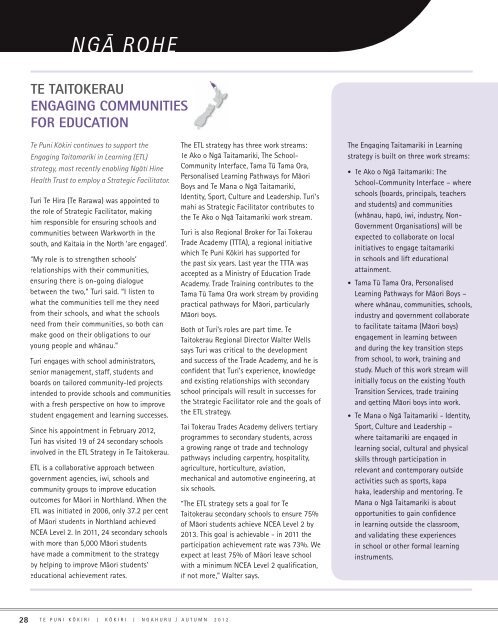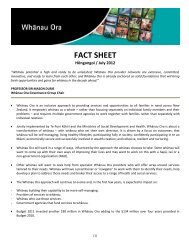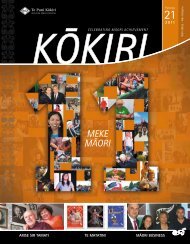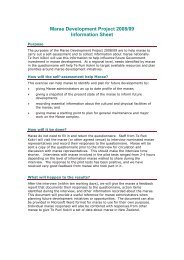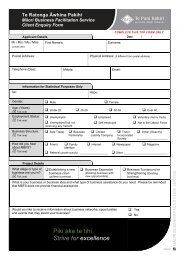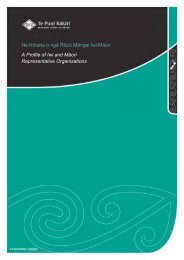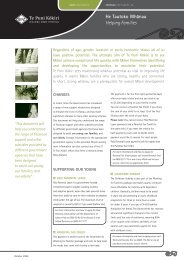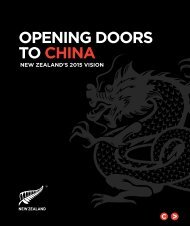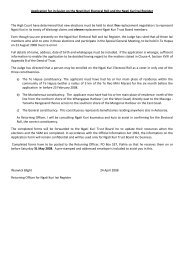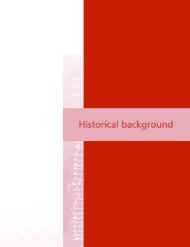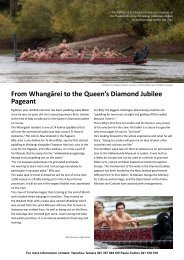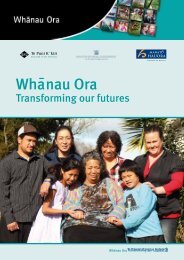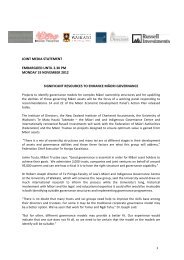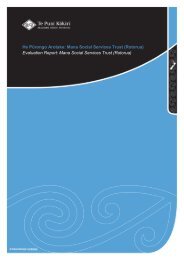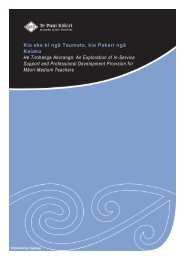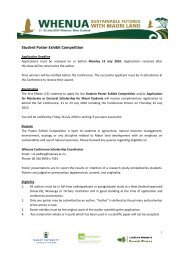Download the PDF (3.8MB) - Te Puni Kokiri
Download the PDF (3.8MB) - Te Puni Kokiri
Download the PDF (3.8MB) - Te Puni Kokiri
Create successful ePaper yourself
Turn your PDF publications into a flip-book with our unique Google optimized e-Paper software.
28<br />
NGÄ ROHE<br />
TE TAITOKERAU<br />
ENGAGING COMMUNITIES<br />
FOR EDUCATION<br />
<strong>Te</strong> <strong>Puni</strong> Kökiri continues to support <strong>the</strong><br />
Engaging Taitamariki in Learning (ETL)<br />
strategy, most recently enabling Ngäti Hine<br />
Health Trust to employ a Strategic Facilitator.<br />
Turi <strong>Te</strong> Hira (<strong>Te</strong> Rarawa) was appointed to<br />
<strong>the</strong> role of Strategic Facilitator, making<br />
him responsible for ensuring schools and<br />
communities between Warkworth in <strong>the</strong><br />
south, and Kaitaia in <strong>the</strong> North ‘are engaged’.<br />
“My role is to streng<strong>the</strong>n schools’<br />
relationships with <strong>the</strong>ir communities,<br />
ensuring <strong>the</strong>re is on-going dialogue<br />
between <strong>the</strong> two,” Turi said. “I listen to<br />
what <strong>the</strong> communities tell me <strong>the</strong>y need<br />
from <strong>the</strong>ir schools, and what <strong>the</strong> schools<br />
need from <strong>the</strong>ir communities, so both can<br />
make good on <strong>the</strong>ir obligations to our<br />
young people and whänau.”<br />
Turi engages with school administrators,<br />
senior management, staff, students and<br />
boards on tailored community-led projects<br />
intended to provide schools and communities<br />
with a fresh perspective on how to improve<br />
student engagement and learning successes.<br />
Since his appointment in February 2012,<br />
Turi has visited 19 of 24 secondary schools<br />
involved in <strong>the</strong> ETL Strategy in <strong>Te</strong> Taitokerau.<br />
ETL is a collaborative approach between<br />
government agencies, iwi, schools and<br />
community groups to improve education<br />
outcomes for Mäori in Northland. When <strong>the</strong><br />
ETL was initiated in 2006, only 37.2 per cent<br />
of Mäori students in Northland achieved<br />
NCEA Level 2. In 2011, 24 secondary schools<br />
with more than 5,000 Mäori students<br />
have made a commitment to <strong>the</strong> strategy<br />
by helping to improve Mäori students’<br />
educational achievement rates.<br />
TE PUNI KÖKIRI | KÖKIRI | NGAHURU / AUTUMN 2012<br />
The ETL strategy has three work streams:<br />
<strong>Te</strong> Ako o Ngä Taitamariki, The School-<br />
Community Interface, Tama Tü Tama Ora,<br />
Personalised Learning Pathways for Mäori<br />
Boys and <strong>Te</strong> Mana o Ngä Taitamariki,<br />
Identity, Sport, Culture and Leadership. Turi’s<br />
mahi as Strategic Facilitator contributes to<br />
<strong>the</strong> <strong>Te</strong> Ako o Ngä Taitamariki work stream.<br />
Turi is also Regional Broker for Tai Tokerau<br />
Trade Academy (TTTA), a regional initiative<br />
which <strong>Te</strong> <strong>Puni</strong> Kökiri has supported for<br />
<strong>the</strong> past six years. Last year <strong>the</strong> TTTA was<br />
accepted as a Ministry of Education Trade<br />
Academy. Trade Training contributes to <strong>the</strong><br />
Tama Tü Tama Ora work stream by providing<br />
practical pathways for Mäori, particularly<br />
Mäori boys.<br />
Both of Turi’s roles are part time. <strong>Te</strong><br />
Taitokerau Regional Director Walter Wells<br />
says Turi was critical to <strong>the</strong> development<br />
and success of <strong>the</strong> Trade Academy, and he is<br />
confident that Turi’s experience, knowledge<br />
and existing relationships with secondary<br />
school principals will result in successes for<br />
<strong>the</strong> Strategic Facilitator role and <strong>the</strong> goals of<br />
<strong>the</strong> ETL strategy.<br />
Tai Tokerau Trades Academy delivers tertiary<br />
programmes to secondary students, across<br />
a growing range of trade and technology<br />
pathways including carpentry, hospitality,<br />
agriculture, horticulture, aviation,<br />
mechanical and automotive engineering, at<br />
six schools.<br />
“The ETL strategy sets a goal for <strong>Te</strong><br />
Taitokerau secondary schools to ensure 75%<br />
of Mäori students achieve NCEA Level 2 by<br />
2013. This goal is achievable - in 2011 <strong>the</strong><br />
participation achievement rate was 73%. We<br />
expect at least 75% of Mäori leave school<br />
with a minimum NCEA Level 2 qualification,<br />
if not more,” Walter says.<br />
The Engaging Taitamariki in Learning<br />
strategy is built on three work streams:<br />
• <strong>Te</strong> Ako o Ngä Taitamariki: The<br />
School-Community Interface – where<br />
schools (boards, principals, teachers<br />
and students) and communities<br />
(whänau, hapü, iwi, industry, Non-<br />
Government Organisations) will be<br />
expected to collaborate on local<br />
initiatives to engage taitamariki<br />
in schools and lift educational<br />
attainment.<br />
• Tama Tü Tama Ora, Personalised<br />
Learning Pathways for Mäori Boys –<br />
where whänau, communities, schools,<br />
industry and government collaborate<br />
to facilitate taitama (Mäori boys)<br />
engagement in learning between<br />
and during <strong>the</strong> key transition steps<br />
from school, to work, training and<br />
study. Much of this work stream will<br />
initially focus on <strong>the</strong> existing Youth<br />
Transition Services, trade training<br />
and getting Mäori boys into work.<br />
• <strong>Te</strong> Mana o Ngä Taitamariki - Identity,<br />
Sport, Culture and Leadership –<br />
where taitamariki are engaged in<br />
learning social, cultural and physical<br />
skills through participation in<br />
relevant and contemporary outside<br />
activities such as sports, kapa<br />
haka, leadership and mentoring. <strong>Te</strong><br />
Mana o Ngä Taitamariki is about<br />
opportunities to gain confidence<br />
in learning outside <strong>the</strong> classroom,<br />
and validating <strong>the</strong>se experiences<br />
in school or o<strong>the</strong>r formal learning<br />
instruments.


